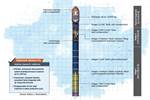Gravitilab, National Composites Centre to design new composite structures for suborbital launch vehicles
Gravitilab team is investigating, designing and trialing a carbon fiber propellant tank for its fleet of suborbital launch vehicles.

Gravitilab composite suborbital rocket. Photo Credit: Gravitilab
Gravitilab (Badersfield, U.K.) is working with the National Composites Centre (NCC, Bristol, U.K.), part of the High Value Manufacturing Catapult, on the analysis and design of new composite flight structures for Gravitilab’s fleet of suborbital launch vehicles.
Gravitilab provides sustainable suborbital launch technology with its reusable rockets and environment-friendly hybrid propellants that deliver sustained and stable microgravity conditions for space hardware and scientific research campaigns..
Working with the Defence and Space team at the NCC, the Gravitilab team is investigating, designing and trialing a carbon fiber propellant tank which also forms part of the outer skin of the launch, thereby reducing complexity and mass. Approximately 30% of the rocket is composite — a sector first, Gravitilab claims — and the company has plans to increase this in later versions, assuming performance targets are achieved. Gravitilab is also working on projects with the NCC’s SME engagement team, NCC Connect.
Gravitilab’s initial launch vehicle, MAX, has been operational for three years. Used widely in testing programs for the European Space Agency (ESA), the three MAX rockets can carry between 1.2- and 3-kilogram payloads and can reach between 0.8- and 1.81-kilometer altitude. ADA, the company’s new 80-kilometer suborbital rocket, is set for flight testing in March 2022 with ISAAC, capable of 120-kilometer distances, set for its maiden flight in October 2022.
“The collaboration with the National Composites Centre forms part of Gravitilab’s ongoing research and development program to optimize launch vehicles that are lighter and more cost-effective than anything else that currently exists in the market,” says Gravitilab Technical Director, Rob Adlard. “The opportunity to partner with the NCC enables disruptive space companies such as Gravitilab, to access the latest composites expertise and technology to exploit the huge benefits of composite materials for our lightweight but robust, reusable launch vehicles.”
The National Composites Centre supports U.K. businesses of any size to accelerate the use of advanced composite materials. The partnership with Gravitilab said to be a great example of how the NCC can support U.K. organizations to accelerate R&D and increase the value of the U.K.’s technology, making companies more globally competitive more quickly.
“We are delighted to be supporting Gravitilab with the ongoing research and development for using advanced composite materials in their family of sub-orbital launcher,” concludes Sean Cooper, chief engineer for Defence and Space at the National Composites Centre. “The adoption of new lightweight materials is going to make a step-change for future cost-competitive launch in the U.K., and Gravitilab are pushing the limits of composite materials technology for their ADA and ISAAC launchers as part of some very exciting near-future engineering projects. It is great for the NCC to play our part in that story.”
Related Content
-
Plant tour: Teijin Carbon America Inc., Greenwood, S.C., U.S.
In 2018, Teijin broke ground on a facility that is reportedly the largest capacity carbon fiber line currently in existence. The line has been fully functional for nearly two years and has plenty of room for expansion.
-
PEEK vs. PEKK vs. PAEK and continuous compression molding
Suppliers of thermoplastics and carbon fiber chime in regarding PEEK vs. PEKK, and now PAEK, as well as in-situ consolidation — the supply chain for thermoplastic tape composites continues to evolve.
-
Plant tour: Joby Aviation, Marina, Calif., U.S.
As the advanced air mobility market begins to take shape, market leader Joby Aviation works to industrialize composites manufacturing for its first-generation, composites-intensive, all-electric air taxi.
















